You also want an ePaper? Increase the reach of your titles
YUMPU automatically turns print PDFs into web optimized ePapers that Google loves.
14 ❘ FREE/OPEN SOURCE SOFTWARE: LOCALIZATIONAfter considering and later rejecting (for lack of real industry interest) the creation of an IndustryConsortium, the project soon found a home in the local Open Forum of Cambodia, an NGO with a longhistory of supporting technologies for social purposes in Cambodia.Sharing the idea of the project with anybody who would listen, setting up a Web site (www.khmeros.info),and initiating contact with various people interested in Khmer and computers, brought in the firstvolunteers.Typographer Danh Hong put into the public domain one of his Khmer OpenType fonts. This was animportant preliminary step to get the FOSS community interested in this language.Lin Chear, a Canadian engineer of Khmer origin, started looking at Pango and in a few days created thenecessary programs to support Khmer in Gnome and its family of products. Khmer will be supported byversion 1.6 of Pango. KDE followed soon after.With the help of Lin Chear, the European maintainer of Qt, developed the routines needed for supportingKhmer in KDE and programs that use Qt for language support. Lin Chear applied a Pango patch to Mozillaand got a version of Mozilla working in Khmer on GNU/Linux.Back in Phnom Penh, the KhmerOS project established itself in a small office at the Open Forum facilities.Using USD1,500 from the first small donations, they hired two computer scientists and with a couple ofold donated computers, started creating a glossary of Khmer computer terms as preliminary work beforestarting the translation. A donation from a Hong Kong businessman would later permit the purchase ofnew computers.Meanwhile, work and discussion regarding keyboards and collation algorithms are ongoing.Implementations in the Thai language show that dictionary based line-breaking can be done in languagesthat do not separate their words. Work on conversion of texts in legacy fonts to Unicode encoding hasalso started.“Evangelization” for Unicode is a necessary part of the project’s work. Large amounts of money are donatedto Cambodia or used by NGOs for computer-related projects, such as creating a database of all Cambodianlaws. If these projects are not done in Unicode, the databases will be useless in a few years.Future plans include increasing the project team to five translators with at least one of them a professionaltranslator, and releasing email, browsing, word processing and spreadsheet programs in Khmer(Thunderbird and Firefox from Mozilla and OpenOffice.org Writer and Calc).These programs will all be released on MS Windows (2000 and XP), and will have full documentation inKhmer, as well as basic training modules in Khmer to be used by computer training professionals. Trainingmaterials are important in order to fix the language and terminology used by teachers, assuringstandardization and avoiding use of too many ‘’anglicisms’’.The translation of Gnome or KDE (or both) began in 2004, as well as a series of minor applications thatwill allow the release of a complete GNU/Linux-based system in Khmer in the second half of 2005.Funding is still a major concern. Project speed is adjusted to suit funding, which comes either throughgrants or through contracts with corporations or other NGOs that need translated programs or servicesrelated to Khmer Unicode that can be provided by the project itself.On the technical level, support is still required for Khmer script in IBM’s ICU library. Full integration in ICUwill compel the project to define all such issues clearly, as well as open the way for developing Khmerapplications in Java.Another concern is being able to use low-priced computers. In the Microsoft environment, Khmer Unicodewill work only in Windows 2000 and XP, which require modern computers with a fair amount of memoryand large hard disks. The way to low-priced (i.e., secondhand) Khmer computers will definitely have tobe either through GNU/Linux or by getting Khmer script support in earlier versions of Windows such asWindows 98.The project’s distribution strategy is to try to have the software pre-installed by computer vendors anddistributed by “two-dollars-a-CD” software vendors. This is to allow easy copying and wide distribution,thereby saving the project the cost of making copies.
















